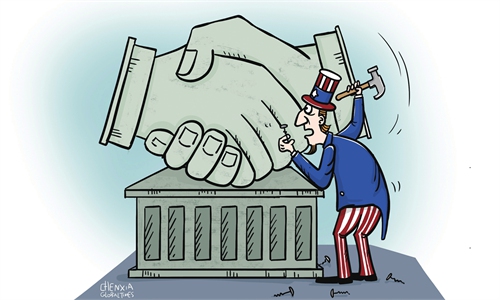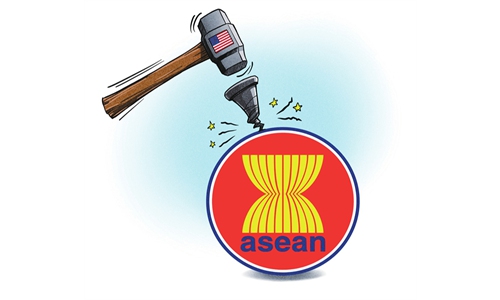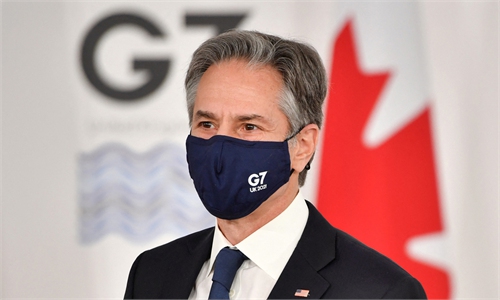
ASEAN flag. Photo: VCG
A newly released survey on the perception of China and the US in Southeast Asian countries revealed that Biden administration's frequent appearance in the region has seemingly "paid off", with a hike of 10.4-percentage points in those who view it as a leading force in free trade.
Confidence in Southeast Asia on the US' leadership in global free trade expanded from 19.7 percent last year to 30.1 percent, according to the survey conducted by the ASEAN Studies Centre at the ISEAS - Yusof Ishak Institute on Wednesday.
China came in second place with 24.6 percent of the votes, an increase of 11.4 percentage points from the survey last year. In an overall view, China continues to be highly regarded as the most influential economic power by 76.7 percent of the respondents in a consistent trend since 2019, said the survey.
Though China remains as the "most influential economic power," the report noted that the US has gained significant ground in the last year from respondents across most ASEAN member states.
Some suggest that the US has made progress in its "competition" with China for the so-called influence in Southeast Asia. Maybe, some of the regional members are tilting toward the US. Is this the case? It is highly unlikely.
Since Biden took over office in January 2021, many have pinned high hopes on his administration to redress the unilateralism of the previous Trump administration and bring the world's largest economy back into track to be the real leader of free trade and other global issues.
The truth is, taking Southeast Asia as an example, Washington is more of a spoiler in the region than a deliverer of any substantial benefits to the region. Holding the objective of confronting China, the US has been launching geopolitical games in the region with the intention of driving a wedge between China the ASEAN members. In fact, it has undermined peace and stability in the region. For instance, it has heightened the risk of nuclear proliferation in Asia-Pacific by setting up the AUKUS security partnership with Australia and the UK.
However, peace and stability has always been a key premise of the region's growth in the past decades. As Asia becomes the most energetic and promising region in the 21st century, it is even more significant for all members in the region.
Based on strong industrial complementarities, China and ASEAN have grown into each other's largest trading partner. With the entry into force of the Regional Comprehensive Economic Partnership (RCEP), economic integration in the region has reached a new milestone.
In addition to such rosy trading partnership, cooperation between the two sides is expanding to a wide range of economic areas, from 5G network to green energy and finance.
But even in the free trade area, where it was suggested that the US was regaining the trust of Southeast Asian countries, the truth might tell a different story. Not only has it dropped out of the Trans-Pacific Partnership Agreement (TPP), but it has also been interrupting the global supply chain of semiconductors and fighting a reckless trade war with China.
All these do not align with the essential interest of ASEAN members and obviously would not support the US' further progress in "competing with China for influence."
The trend of Asia becoming the economic center of the world will not be reversed by Washington's political maneuvers and the prospect of mutually beneficial cooperation between China and ASEAN will remain promising.
The author is an editor with the Global Times. bizopinion@globaltimes.com.cn



